You are here
New Releases
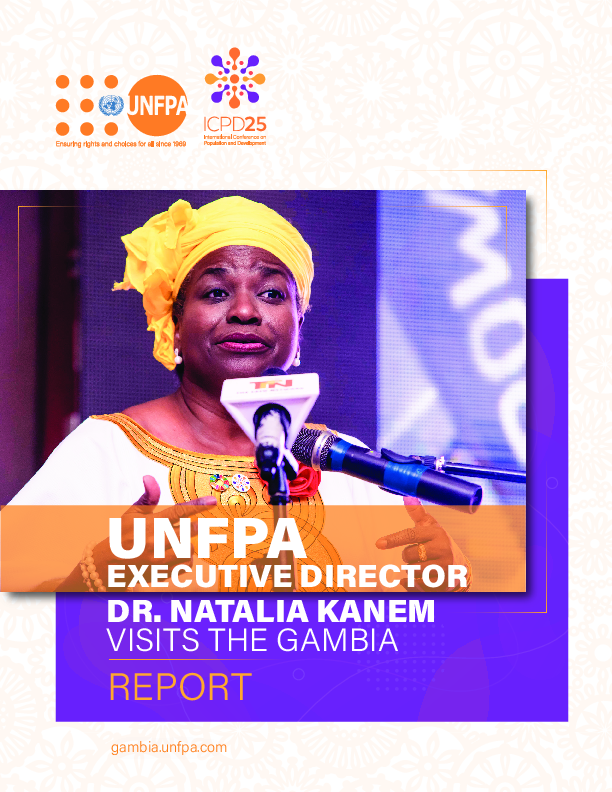
Report of UNFPA Executive Director, Dr. Natalia Kanem's Visit to The Gambia
This report summarises highlights of UNFPA Executive Director, Dr. Natalia Kanem's visit to The Gambia from the 8 to 10 August 2019. Her visit is part of efforts to mobilise governments' commitments to the ICPD agenda, as we head to the Nairobi Summit on ICPD+25 in November 2019. Dr. Kanem began her engagements in the country with a Youth Bantaba with Gambian Young People dubbed "Road to Nairobi Temperature Check with Dr Natlai Kanem" and this was followed by a UNFPA@50 Partnership Celebration Dinner, hosted by the government of The Gambia. Some major highlights of her visit also include her courtesy visit to H.E. the President of The Gambia Mr. Adama barrow, and the meeting with the National Population Council.
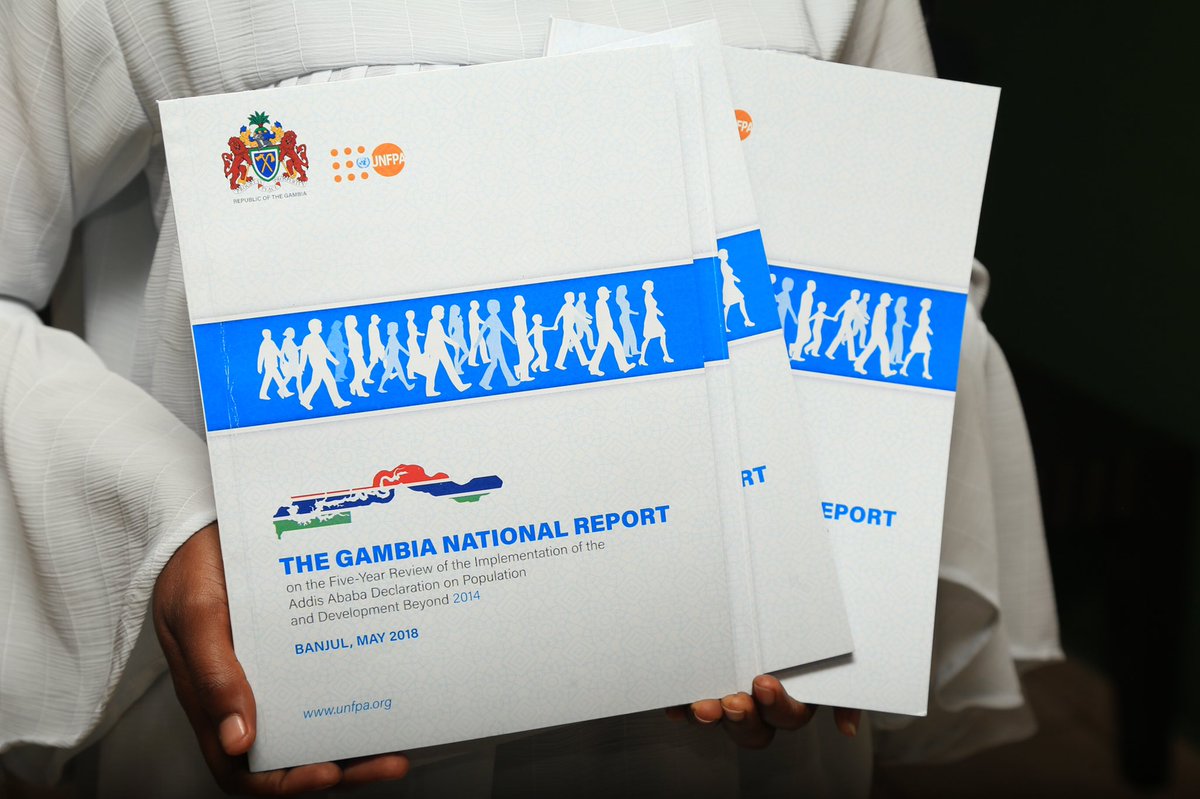
The Gambia National Report on the Five Year Review of the Addis Ababa Declaration on Population and Development Beyond 2014
The 1994 Cairo Conference or ICPD adopted a new Programme of Action (PoA) as a guide for national and international action in population and development for the next 20 years. The PoA emphasises the enduring link between population on one hand and development on the other hand; and introduced for the first time the concepts of sexual and reproductive health and reproductive rights. The African consensus on the ICPD beyond 2014, is known as the Addis Ababa Declaration on Population and Development (AADPD).
This National report reviews the progress and evaluates the extent to which The Gambia has fulfilled the commitments reflected in the AADPD over the past five years. The country’s prospects for harnessing the demographic dividend are also assessed.
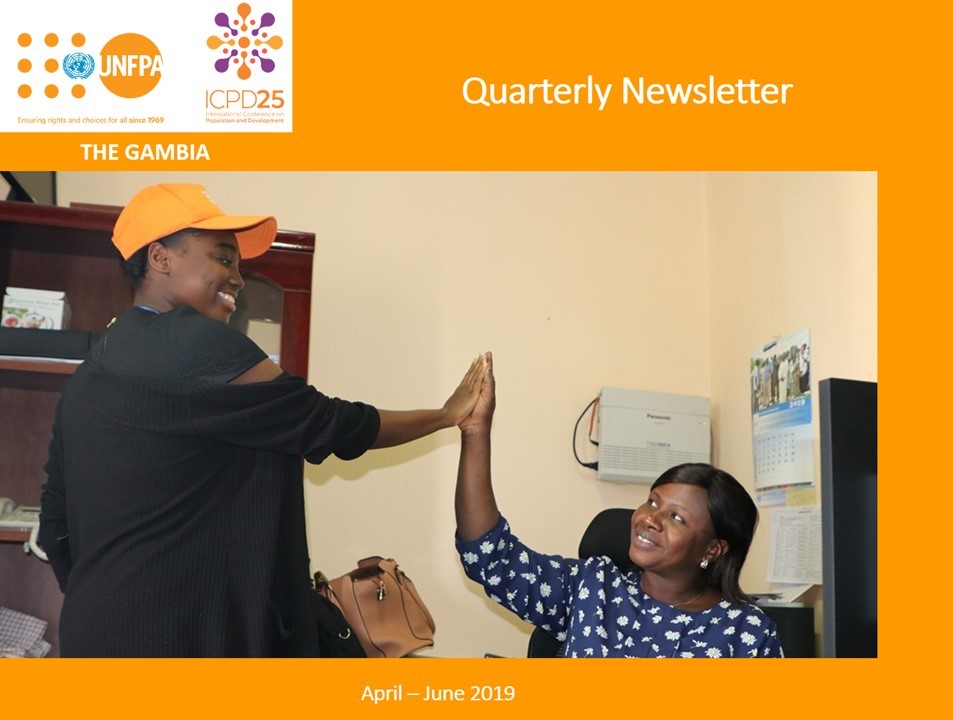
UNFPA The Gambia Quarterly Newsletter (April - June) 2019
We bring you some highlights of our activities over the course of the second quarter of the year (April to June 2019).
Enjoy reading!
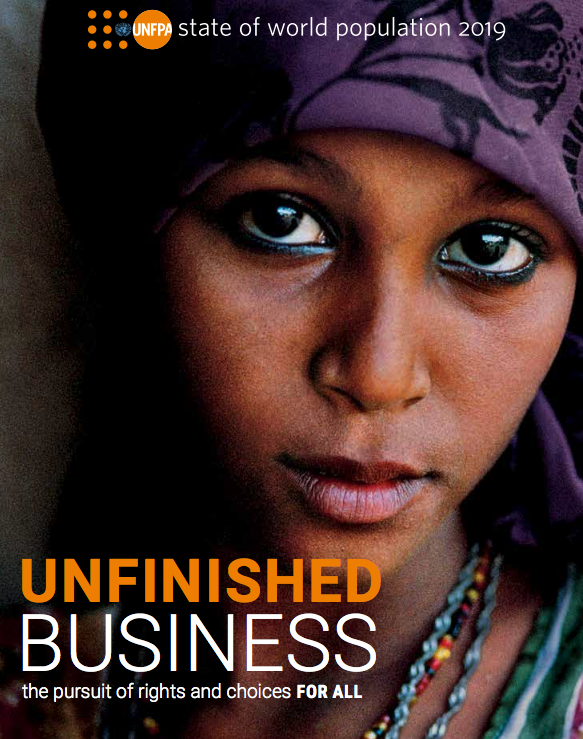
State of World Population 2019
Fifty years ago, it was hard for women to obtain contraception and relatively easy to die giving birth. Many women were unable to decide whom and when to marry, and when or whether to have children.
A worldwide movement to give women real choices in life culminated in the 1994 International Conference on Population and Development (ICPD), where a consensus was reached about the links between women’s empowerment, sexual and reproductive health, and rights and sustainable development.
UNFPA The Gambia Quarterly Newsletter (January - March ) 2019
Welcome to this edition of our quarterly newsletter. This issue captures stories of our work during the first quarter of 2019 (Januray - March). Happy reading!
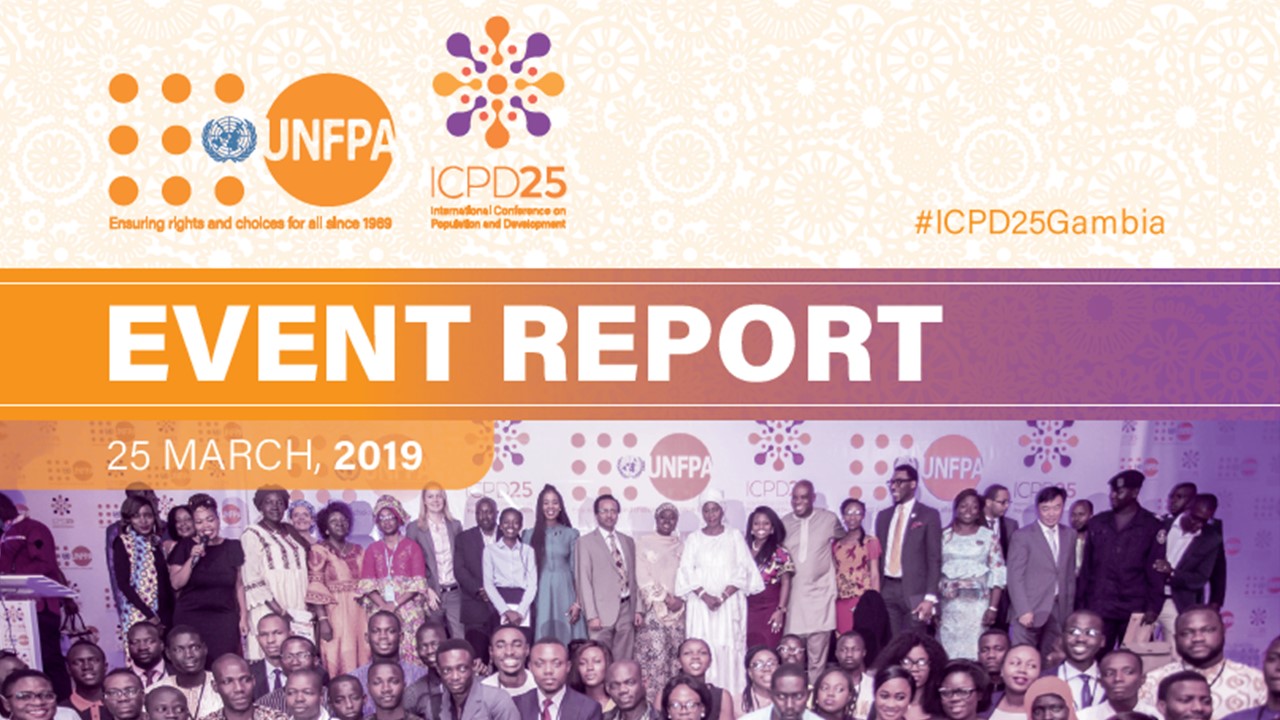
ICPD25 Gambia Event Report
The 25th anniversary of the International Conference on Population and Development in Cairo, Egypt, coupled with the 50th anniversary of UNFPA, call for galvanized efforts to take stock of the progress we have made so far and the gaps that remain in our drive to accelerate the ICPD Programme of Action. As such, UNFPA The Gambia, leveraged the 3rd Pan-African Youth Conference on African Unity and Development, co-hosted by the African Youth Commission (AYC) and the National Youth Council (NYC) under the auspices of the Ministry of Youth and Sports The Gambia, organised three high-level panels, capturing the voices and contributions of African youth, towards the achievement of the ICPD agenda.
This report captures the proceedings and outcomes of the event held on 25 March 2019.
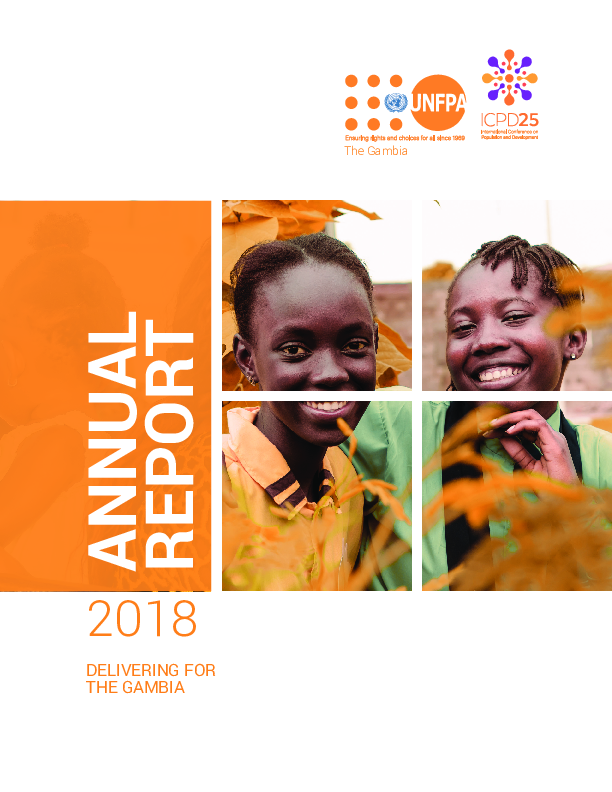
UNFPA The Gambia 2018 Annual Report
Ending the unmet need for Family Planning, ending preventable maternal deaths and ending Gender-Based Violence, the three ambitious and transformative results that the United Nations Population Fund (UNFPA) works to achieve, although may seem difficult, are possible, if we strategically position our investments and efforts in young people, women and adolescents. This is what guides our work in The Gambia.
UNFPA support to The Gambia, dates back to 1972. Since then, support from UNFPA to the country has been through successive Country Programmes (CP), the current programme being the eighth.
The Country Programme has been designed to support national efforts to harness the Demographic Dividend (DD) of a youthful population, through high impact investments in sexual and reproductive health and the elimination of gender-based violence, which hinder the potential of adolescents and youth, especially girls, to effectively contribute to poverty reduction and national development in general.
Guided by the Sustainable Development Goals (SDGs), our Country Programme aims to target highly vulnerable women and youth in selected regions of the country. In the interest of maximal programme impact, it has been decided to concentrate programme effort at two outcome areas, namely Sexual and reproductive health and Adolescents and Youth.
As a result, this annual report, will take you through our 2018 journey, highlighting significant achievements recorded, in our efforts to realise the agency’s transformative results.
In 2018, the Country Office invested in the expansion of the Community-Based Distribution Programme, reaching an additional twenty (20) hard-to-reach communities, with Family Planning (FP) information and services.
Since the provision of Basic Emergency Obstetric and Newborn Care (BEmONC) is a primary health care initiative strategy used to reduce maternal and newborn mortality, the agency supported the upgrading of seven (7) health facilities into BEmONC delivery centers and trained fifty (50) midwives from selected health facilities on how to perform the seven signal functions for a BEmONC facility.
Additionally, during the course of the year, Fifteen Thousand, Two Hundred and Twenty-Three (15,223) young people were reached with information on Adolescent Sexual and Reproductive Health (ASRH), while Ten Thousand, Four Hundred and Sixty-One (10,461) youth in schools, were reached with information on the benefits of family planning.
Furthermore, through our programming, we supported 10 Maternal Death Audit Reviews (MDRs) in hospitals and major health centers across the country and also supported 19 Obstetric Fistula repair surgeries, a move geared towards giving women living with this condition, a chance to restore their dignity and hope for survival.
While major results were recorded in 2018, we look forward to continue delivering for The Gambia in 2019 and beyond, results for the benefit of key populations – women, youth and adolescents, accompanied by our partners and the communities we serve.
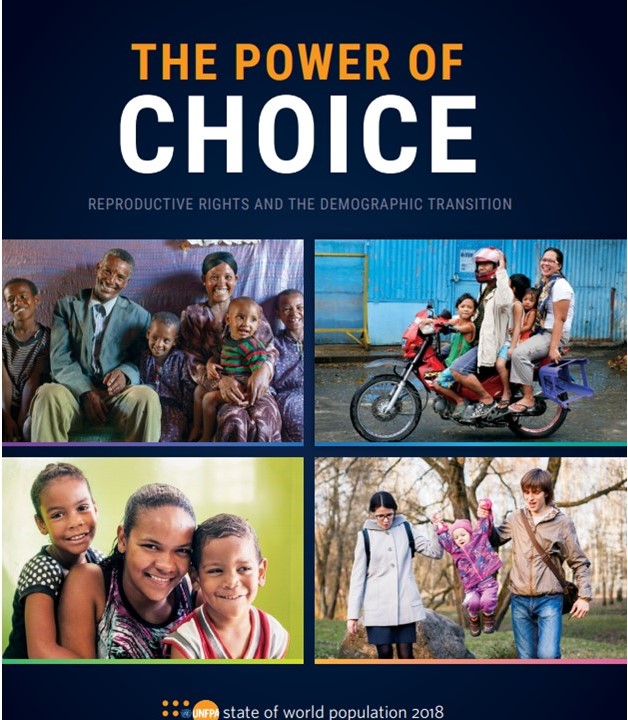
State of World Population 2018 Report
CHOICE CAN CHANGE THE WORLD. It can rapidly improve the well-being of women and girls, transform families and societies, and accelerate global development. The extent to which couples and individuals have real choices about whether and when to have children, and how many children to have, also has a direct impact on fertility levels. Where people are able to make these decisions for themselves, they tend to choose smaller families.
Where choices are constrained, they tend to have families that are either large or very small, sometimes with no children at all. No country can yet claim to have made reproductive rights a reality for all. Choices are limited for far too many women. And this means that there are still millions of people who are having more—or fewer—children than they would like, with implications not only for individuals, but also for communities, institutions, economies, labour markets and entire nations.
For some, the pursuit of reproductive rights is thwarted by health systems that fail to provide essential services, such as contraceptives. For others, economic barriers, including poor-quality, low-paying jobs and an absence of childcare, make it next to impossible to start or expand a family. Underlying these and other obstacles is persistent gender inequality, which denies women the power to make fundamental decisions in life.
In the 1994 Programme of Action of the International Conference on Population and Development, governments committed to enabling people to make informed choices about their sexual and reproductive health as a matter of fundamental human rights. Now, almost 25 years later, this continues to require ensuring that individuals have access to the means to decide freely and responsibly the number, spacing and timing of their children. The 2030 Agenda for Sustainable Development reinforces these principles by making reproductive health and rights a specific aim. In fact, reproductive rights are integral to realizing all the Sustainable Development Goals. THAT IS THE POWER OF CHOICE.
The way forward is the full realization of reproductive rights, for every individual and couple, no matter where or how they live, or how much they earn. This includes dismantling all the barriers—whether economic, social or institutional—that inhibit free and informed choice.
This report is about global fertility trends, but it is also about choice- or lack of it - and what that means for women, for couples, and for countries' prospects for development.
The report makes the case that choice can change the world.
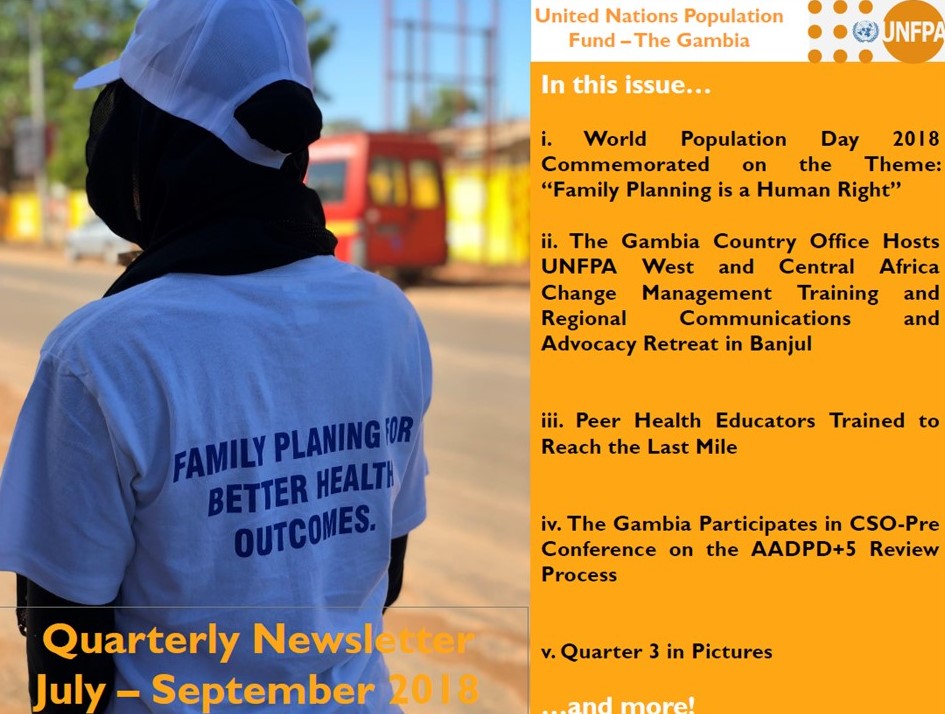
UNFPA The Gambia Quarterly Newsletter (July - September) 2018
Welcome to this edition of the UNFPA The Gambia Quarterly Newsletter. In this issue, we bring you stories from our World Population Day 2018 Commemoration, the Regional Change Management Workshop and the Communications and Advocacy Retreat held in Banjul, and other exciting activities. We hope you enjoy reading!
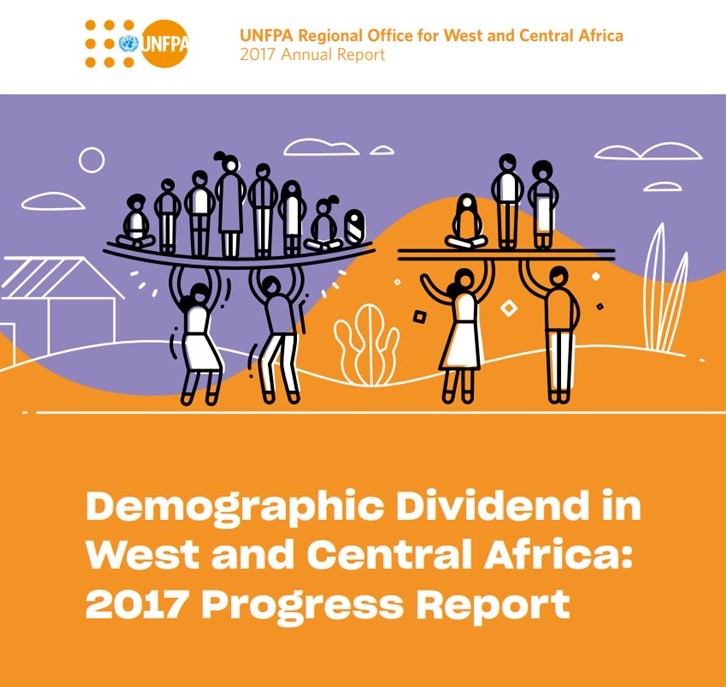
The Demographic Dividend in West and Central Africa: 2017 Progress Report
UNFPA WCARO is delighted to have championed advocacy efforts that led to African leaders making young people their top priority in all their development, peace and security initiatives. In 2017, key actors across the continent, got involved and engaged in discussions, activities, projects and programmes around the demographic dividend agenda. This helped us to further raise awareness and explore ways of enhancing our understanding of the concept of demographic dividend and what it means in operational terms. At this point, it is important to reflect on the progress made and the challenges ahead, and to also decide how to consolidate discussions around the demographic dividend and its operationalization, in order to continue our work in transforming the lives of young people.